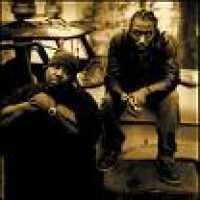trailblazing mid- to late-'90s recordings for Suave Records served as blueprints for the wave of Dirty South rappers who would begin emerging on indie labels of their own toward the end of the decade. The pioneering duo enjoyed increasing recognition as the years passed. Eventually, they signed to Bad Boy Records, debuting in 2004 with Living Legends. In addition, Eightball & MJG recorded individually; Eightball was by far the more prolific of the two. The duo's reputation overshadowed their commercial fortunes, for the most part. They were widely respected by their peers, for instance, even though they struggled to score major crossover hits. Nonetheless, Eightball & MJG outlasted most of their competition, releasing a steady stream of albums year after year. There were no acrimonious incidents, no run-ins with the law, no "retirements," no hangups whatsoever -- if anything, Eightball & MJG were respectably reliable over the course of their career. Eightball (Premro Smith) and MJG (Marlon Jermaine Goodwin) grew up in the rough Orange Mound area of Memphis and met at Ridgeway Junior High in 1984. They shared a passion for hip-hop, which hadn't yet made a strong impact in the South, and soon formed a partnership. After years of mixtape work, later re-released on the Lyrics of a Pimp (1997) and Memphis Under World (2000) compilations, the two started Suave Records with savvy 20-year-old CEO Tony Draper. The label released Eightball & MJG's debut full-length, Comin' Out Hard (1993), a cult classic produced entirely by the duo and popularized by the song "Armed Robbery."
Each successive year brought with it a new album: On the Outside Looking In (1994) and On Top of the World (1995), the latter distributed nationally by Relativity. These releases continued to expand the duo's reach throughout the South, so much so that Universal Records offered Draper a lucrative distribution deal in 1997 for Suave. Eightball & MJG afterward released a pair of solo albums -- Lost (1997) and No More Glory (1998), respectively -- and went on to record their crowning achievement, In Our Lifetime, Vol. 1 (1999). The album elevated the duo to nationally recognized status and earned universal acclaim, ultimately standing as one of the definitive Dirty South albums of the era, alongside Goodie Mob's Soul Food (1995) and OutKast's late-'90s work.
Eightball & MJG parted ways with Suave in 1999 and maintained a relatively low profile for a few years until they signed with P. Diddy's Bad Bay label in 2002, recording an album for Jcor (Space Age 4 Eva [2000]) and scoring a widespread club hit ("Buck Bounce") in the meantime. A new track, "Don't Make," started to appear on mixtapes in 2003 and was followed by the duo's first album for Bad Boy, Living Legends (2004). Eightball & MJG's second Bad Boy release, Ridin High, came out in 2007, led by the single "Relax and Take Notes." ~ Jason Birchmeier, All Music Guide
